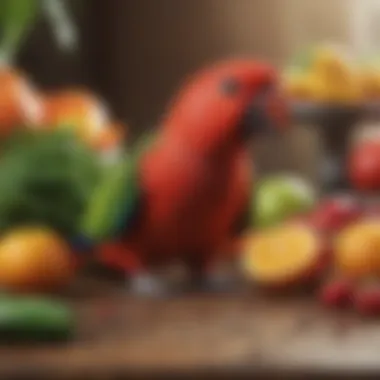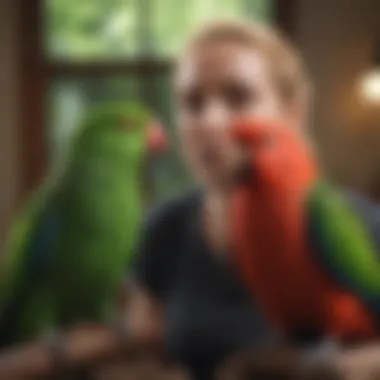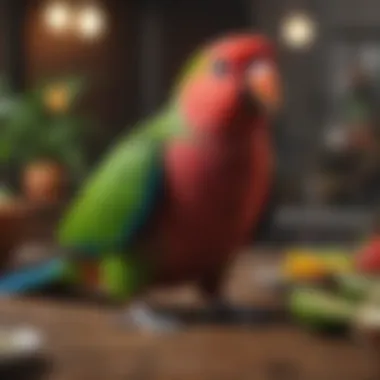Understanding Eclectus Parrots: Nutrition and Dietary Needs


Intro
Eclectus parrots, with their stunning colors and distinctive behaviors, present unique challenges and joys for pet owners. Understanding their specific dietary needs is critical for their overall health and happiness. These birds have a natural diet that differs significantly from typical pet bird fare, making it essential to tailor their nutrition to meet those needs. The following sections will provide a comprehensive understanding of eclectus parrots, focusing on nutrition, feeding habits, and common misconceptions that can lead to health issues.
Understanding Your Pet
Pet Behavior Basics
Eclectus parrots exhibit unique behaviors heavily influenced by their environment and diet. Understanding these behaviors is crucial for any pet owner. They tend to be social, forming strong bonds with their caregivers. However, they can display signs of stress if their needs are not met, such as reduced appetite or aggressive behavior. Recognizing these signs early helps in managing their well-being effectively.
Common Breed Characteristics
Eclectus parrots are notable for their sexual dimorphism; males are a bright green, while females are a brilliant red and purple. This visual difference is relevant not just for identification but also influences their care needs. Males typically require diets that are richer in specific nutrients than females. Understanding these characteristics aids in selecting the right nutrition and environments that cater to their needs.
Species-Specific Needs
Eclectus parrots have special dietary requirements, primarily consuming fruits and vegetables in their natural habitat. This species thrives on a diet that includes a variety of foods rich in vitamins and minerals. Neglecting their specific needs can lead to health complications, underscoring the importance of specific dietary planning for eclectus parrots.
Pet Care and Maintenance
Feeding Guidelines
Feeding eclectus parrots involves a careful approach to diet selection. Their meal plans should consist of fresh fruits, vegetables, and leafy greens, along with formulated pellets specific to their needs. Avoiding seeds is crucial, as they lack the necessary nutrition for these birds. Aim to offer small portions multiple times a day to encourage a natural foraging behavior.
Grooming Essentials
Grooming is also an essential aspect of care. Regular feather checks and nail trims help maintain health and prevent discomfort. Be gentle and consistent to make the experience less stressful for your parrot. A calm approach fosters trust and better cooperation during grooming sessions.
Hygiene Practices
Maintaining hygiene is equally important. Ensure the living space is clean by regularly replacing bedding and cleaning food dishes. This can prevent the spread of illness and keep your eclectus parrot healthy.
Health and Wellness
Routine Vet Check-ups
Regular veterinary visits are vital for preventing health issues. Schedule check-ups at least once a year, or more frequently if any health concerns arise. A vet familiar with avian care can provide expert advice tailored to your parrot’s needs.
Vaccination Needs
Vaccinations are also critical. Discuss with your veterinarian the appropriate vaccination schedule for your eclectus parrot. Staying up to date can protect your parrot from preventable diseases.
Recognizing Signs of Illness
Being aware of your parrot's behavior aids in catching illnesses early. Signs of concern can include changes in eating habits, unusual vocalizations, or lethargy. If you notice any of these signs, seek veterinary attention promptly.
Enrichment and Activities
Indoor vs.
Outdoor Activities
Eclectus parrots benefit from a mix of indoor and outdoor activities. Indoor playtime is essential for mental stimulation, while safely supervised outdoor time allows them to explore new environments. Balancing these activities keeps your parrot engaged and healthy.
Interactive Toys and Games
Introduce interactive toys to encourage play and exercise. Toys that challenge their problem-solving skills keep eclectus parrots stimulated and reduce boredom, which can lead to behavioral problems.
Socialization Opportunities
Socialization is crucial for eclectus parrots. Expose them to various people and safe environments to help them develop confidence and comfort in different situations. This fosters good behavior and enhances their quality of life.
Understanding the unique nutritional and care needs of eclectus parrots ensures they thrive as vibrant pets in your home.
By focusing on these critical areas, pet owners can provide the optimal environment and dietary needs for these intelligent and colorful birds. A commitment to their health and well-being translates to happier, more fulfilled eclectus parrots.


Prologue to Eclectus Parrots
Eclectus parrots are captivating creatures, both visually and in terms of their care. Understanding them deeply is crucial if you wish to keep these birds as pets. Their distinct physical characteristics, such as the sexual dimorphism displayed in their plumage, create an inherent fascination. Recognizing the differences between male and female eclectus is not just about aesthetics; it also plays a role in addressing their dietary needs, behavior, and care requirements.
The topic of eclectus parrots reaches beyond simple facts; it encompasses the nuances of their well-being. These birds hail from lush tropical environments, and mimicking their natural habitat in captivity is imperative for their health. Mistakes in their care, particularly concerning diet, may lead to health issues unfelt until it's too late. Understanding these needs enables pet owners to make informed choices about feeding.
Proper nutrition is fundamental to the long-term health of eclectus parrots. A neglected diet can manifest in various health problems including feather plucking or declining vitality. Discussing their unique dietary needs can help to avoid these pitfalls and promote a happier life for these remarkable animals.
Moreover, learning about eclectus parrots enriches the bond between the bird and its owner. Knowledge about their dietary requirements, preferences, and habits leads to more interaction and a deeper understanding of their needs. This article aims to unravel these elements, ensuring you, as a pet owner or animal lover, are well-equipped to foster a healthy environment for your feathered friend.
Key considerations when caring for Eclectus parrot include:
- Understanding their natural diet
- Recognizing the importance of a varied diet
- Learning about potential health risks associated with poor nutrition
Natural Habitat and Diet
Understanding the natural habitat and diet of eclectus parrots is a fundamental aspect of their care as pets. This knowledge allows owners to create a diet that mimics their natural food sources, contributing to their overall health and well-being. The connection between a parrot's environment and its dietary needs is essential, as it helps to maintain their physical and emotional health. A proper diet not only enhances their vibrant colors but also supports their longevity and reduces the risk of health issues.
Eclectus in the Wild
Eclectus parrots are native to the tropical forests of Solomon Islands, New Guinea, and surrounding areas. In their natural environment, these birds inhabit lowland forests, which provide them with access to a variety of food sources. The ecology of these habitats plays a significant role in shaping their dietary preferences. They are often found in flocks, which aids in locating food and offers social structure and interaction.
These parrots are primarily frugivorous, meaning their diet is largely composed of fruits. Aside from fruits, they also consume nuts, seeds, and flowers. This diverse diet in the wild supports their nutritional needs, allowing them to thrive among the tropical foliage. Observing their natural habits can inform pet owners about the best food choices, leading to a more balanced diet for captive eclectus parrots.
Common Food Sources
In the wild, eclectus parrots feast on a range of fruits and vegetables. Their preferred food sources might include:
- Papaya
- Mango
- Figs
- Bananas
- Pawpaw
These fruits are rich in the vitamins and minerals essential for their health. They also forage for nuts, including various seeds which provide protein and fats necessary for their energy needs.
Understanding these common food sources helps pet owners replicate such a diet. Fresh fruits and vegetables should be staples in an eclectus parrot's diet to ensure they receive adequate nutrition. This insight not only highlights the importance of their natural diet but also emphasizes the need to offer a variety of foods to maintain their health and activity levels.
Essential Nutrients for Eclectus Parrots
Understanding the essential nutrients required by Eclectus parrots is crucial for their overall health and longevity. These birds, known for their distinct coloration and personality, have specific dietary needs that differ from other parrots. Providing a balanced diet will promote vibrant plumage, good behavior, and well-functioning bodily systems. In this section, we will explore the critical components of their nutrition, focusing particularly on vitamins, minerals, proteins, and fats.
Vitamins and Minerals
Vitamins and minerals play a significant role in an Eclectus parrot's health. They help in various bodily functions and processes, each serving a unique purpose. Nutritional deficiencies can lead to serious health issues, including feather plucking or weakened immune systems.
Vitamins
- Vitamin A is essential for good vision, skin, and immune function. A deficiency can cause respiratory issues or coat abnormalities.
- Vitamin D3 aids in calcium absorption, crucial for bone health. Lack of this vitamin may lead to skeletal deformities.
- Vitamin E works as an antioxidant, protecting cells from damage. It supports immune health and skin integrity.
These vitamins can be found in fresh fruits and vegetables such as carrots, spinach, and sweet potatoes. Owners should aim to provide a varied range of these foods in their parrot's diet.
Minerals
- Calcium is vital for bone strength and reproductive health. Insufficient calcium may cause metabolic bone disease.
- Phosphorus works closely with calcium and is necessary for cellular function.
- Sodium and potassium help in muscle function and overall hydration balance.
Minerals should ideally come from a combination of fresh produce and specialized parrot pellets, ensuring they meet daily requirements.
Proteins and Fats
Proteins and fats are fundamental energy sources and are involved in numerous physiological activities. Proper intake supports growth, repair, and function of tissues in Eclectus parrots.
Proteins
- Proteins contribute to muscle development and repair, making them crucial for active parrots. They also play a role in hormone and enzyme production.
- Good sources of protein for Eclectus parrots include legumes, cooked eggs, and quinoa.
Encouraging a protein-rich diet can be beneficial, but one must be cautious not to overfeed, as excessive protein can disturb health balance.
Fats


- Fats are needed for energy and support a healthy skin and feather condition. However, choosing the right types of fat is essential. Unsaturated fats, found in nuts and seeds, are preferable over saturated fats.
- Too much fat can lead to obesity and other health problems.
A balanced approach that incorporates appropriate amounts of both proteins and healthy fats will help maintain the parrot's energy levels and overall health.
Recommended Foods for Eclectus Parrots
Understanding the correct foods to offer eclectus parrots is vital for their health and vitality. Their nutritional needs are specific and must be approached with care. A well-rounded diet contributes to a pet's well-being, leading to a longer and healthier life. Importantly, by knowing what foods to prioritize, owners can ensure their companions thrive.
Fresh Fruits and Vegetables
Fresh fruits and vegetables are essential components of an eclectus parrot's diet. These food items provide necessary vitamins, minerals, and fiber. Varieties such as apples, carrots, spinach, and bell peppers are among the best choices. They not only offer nutrients but also promote natural foraging behaviors, which are important for emotional health.
Choosing organic produce when possible can minimize exposure to pesticides. It's crucial to wash all fruits and vegetables thoroughly before offering them to ensure they are safe. Cut them into manageable pieces so the birds can eat easily. Be mindful of seeds in fruits like apples; always remove them as they can be harmful in significant quantities.
Fresh produce not only supplies essential vitamins but also stimulates the parrot's curiosity and exploratory nature.
Pellets and Seeds
High-quality pellets serve as a staple food option for eclectus parrots. When selecting pellets, look for those that contain natural ingredients without artificial colors or preservatives. Pellets are formulated to provide balanced nutrition, which might be lacking in seed mixes. However, it's still reasonable to include some seeds, as they can be part of an eclectus parrot's diet. Ideally, seeds should only comprise a small portion of their daily food intake.
For a balanced approach, consider the following:
- Choose pellets made specifically for eclectus parrots. These formulations typically contain the right mix of nutrients.
- Limit seeds to occasional treats to avoid imbalanced nutrition.
- Monitor the quality of purchased products to ensure they do not contain fillers or unnecessary additives.
Nuts and Treats
Nuts can serve as a excellent addition to an eclectus parrot's diet. They are calorie-dense but also rich in healthy fats and proteins. Almonds and walnuts are more favorable choices among nuts. However, it is crucial to be cautious with portions as they can lead to obesity if overfed. Treats should generally be limited and given sparingly.
In addition to nuts, consider offering occasional treats that can stimulate and engage your bird. Healthy options are:
- Cooked quinoa or amaranth
- Dried fruits without added sugars
- Small amounts of peanut butter on whole-grain bread
Pay attention to variety; offering different foods keeps meal times interesting.
In summary, the right foods play a significant role in maintaining an eclectus parrot's health. By prioritizing fresh fruits, quality pellets, and appropriate nuts, pet owners can create a balanced and nutritious diet that enhances the overall well-being of their feathered friends.
Feeding Practices
Feeding practices play an essential role in maintaining the health and happiness of eclectus parrots. This section delves into critical elements involved in feeding that benefit both the birds and their owners. Implementing optimal feeding schedules and understanding portion control are vital for preventing obesity and ensuring that your eclectus receives a balanced diet.
Optimal Feeding Schedule
Creating a feeding schedule for your eclectus parrot is important. These birds thrive on routine. A consistent feeding time can help them feel secure and comfortable. Typically, feeding twice a day works well. In the morning, provide fresh fruits and vegetables. In the evening, you can offer pellets or seeds depending on your bird's diet. It is essential to choose a time that fits your daily routine. By doing this, you ensure that the parrot gets used to your schedule.
Benefits of a well-planned feeding schedule:
- Promotes better digestion
- Reduces anxiety in the pet
- Helps owners monitor food intake
Monitoring your eclectus's eating habits is also essential. If the bird is not eating regularly, it may indicate health issues. You should always remove any uneaten food after a couple of hours. Freshness is crucial to the health of your parrot.
Portion Control
Portion control is a significant aspect of eclectus nutrition. These parrots can easily gain weight if overfed. Therefore, providing the right amount of food is important. The quantity can vary based on the age, weight and activity levels of the bird. A good rule is to feed your eclectus parrot about 10% of its body weight in food each day.
Suggestions for effective portion control:
- Use measuring cups to serve food
- Observe your bird's behavior after meals
- Adjust portions based on weight changes over time
Being consistent with portion sizes helps avoid some detrements connected to overfeeding. Ensuring your eclectus maintains a healthy weight will foster longevity and quality of life.
Remember that water availability is also a critical component. Always ensure that your eclectus has access to clean, fresh water throughout the day.
By mastering these feeding practices, you provide a strong foundation for your eclectus parrot's nutrition and ensure their well-being.
Common Misconceptions About Eclectus Nutrition


Understanding the dietary needs of Eclectus parrots is essential for their well-being. However, many pet owners hold misconceptions about what these birds require for proper nutrition. Addressing these misconceptions can aid in crafting a more suitable diet, thus enhancing their quality of life and health. Correct information helps prevent nutritional deficiencies and supports the overall happiness of these parrots.
Understanding Dietary Needs
Eclectus parrots have unique dietary requirements that set them apart from other parrot species. They thrive on a varied diet that mirrors their natural food sources, which primarily consist of fruits, vegetables, and some protein sources. Known for their striking coloration, these birds have evolved to require higher fiber and lower fat than many seed-loving birds.
However, one of the common misunderstandings is that these birds can thrive solely on seed diets. This is incorrect. A seed-only diet often lacks essential nutrients, particularly vitamins A and D, which are crucial for their immune system and vision, respectively. For example, vitamin A supports the health of the skin and feathers, while vitamin D is vital for calcium absorption, affecting bone health.
A balanced diet for Eclectus parrots includes a mixture of fresh produce, specially formulated pellets, and some seeds. Owners should also consult with avian veterinarians to establish a dietary plan tailored to each bird’s specific needs.
Myths Regarding Seed Diets
One prevalent myth is that seeds are the best diet for all birds. While seeds can be part of a parrot's diet, they often do not meet the nutritional demands of Eclectus parrots. Relying heavily on seeds can lead to obesity and related health problems.
Some pet owners believe that affordable seed mixes are sufficient for their birds' nourishment. Although convenient, these mixes often lack necessary supplements and can contain unhealthy fillers such as corn that do not benefit Eclectus parrots. Instead, choosing high-quality pellets formulated for these parrots can provide balanced nutrition.
It's crucial to recognize that providing a wide array of foods is essential. Fruits and vegetables like broccoli, carrots, apples, and berries should be part of their daily diet. These foods not only provide vitamins but also hydration and fiber, which are indispensable for their digestive health.
Health Considerations
Health considerations are a crucial aspect of understanding the dietary needs of Eclectus parrots. These birds have specialized nutritional requirements that, when not met, can lead to serious health issues. A well-rounded diet is essential not only for their physical well-being but also for their mental and emotional health. Pet owners must recognize the signs of nutritional deficiencies and implement preventive health measures to promote longevity and vitality in their feathered companions.
Signs of Nutritional Deficiencies
Recognizing nutritional deficiencies in Eclectus parrots is essential for early intervention. Some signs include:
- Feather Issues: Poor feather condition, such as dullness or molting problems, may indicate a lack of essential nutrients.
- Behavioral Changes: Increased lethargy, irritability, or changes in vocalization can signal improper diet.
- Weight Fluctuations: Sudden weight loss or gain may denote an imbalance in nutrient intake.
- Digestive Problems: Soft or discolored droppings can point to dietary issues.
Regularly monitoring your parrot's general behavior and appearance can help in identifying any potential weaknesses in their diet. If symptoms persist, consulting an avian veterinarian is advisable.
Preventive Health Measures
Preventive measures are vital in ensuring that Eclectus parrots remain healthy. Some effective strategies include:
- Balanced Diet: Provide a variety of foods that cover all essential nutrient groups, such as vitamins, minerals, proteins, and healthy fats.
- Regular Veterinary Check-ups: Routine health checks can help detect underlying issues before they become serious.
- Hydration Monitoring: Ensure that fresh water is always available and clean, as hydration is fundamental to their health.
- Avoiding Harmful Foods: Certain foods, such as chocolate, caffeine, and salty snacks, should be strictly avoided as they can be toxic.
Incorporating these preventive health measures will create an environment conducive to the overall well-being of Eclectus parrots. Investing in their health not only enhances their quality of life but also deepens the bond between pet and owner.
Maintaining a comprehensive understanding of dietary needs ensures that the nutritional interests of Eclectus parrots are not overlooked, fostering healthier and happier pets.
End
Understanding the dietary needs of Eclectus parrots is crucial for their overall health and well-being. This article provided a detailed exploration into various aspects of their nutrition. The significance of balanced diets cannot be overstated. When pet owners comprehend the specific requirements of these birds, they can ensure proper care.
Importance of Proper Nutrition
Eclectus parrots thrive on a varied diet rich in vitamins, minerals, proteins, and healthy fats. Meeting these needs supports their immune systems and promotes vibrant plumage. A well-rounded diet enhances energy levels, supports health, and contributes to longevity.
"A diet tailored to the unique needs of Eclectus parrots can significantly improve their quality of life."
Key Considerations
Pet owners must consider several factors in their feeding practices. This includes:
- Familiarizing with optimal feeding schedules
- Understanding portion control
- Recognizing signs of nutritional deficiencies
Each of these aspects plays a pivotal role in maintaining the health of these birds. By following recommended practices, owners can prevent health-related issues that stem from improper diets.
Final Thoughts
Further Reading and Resources
Understanding the nutritional needs of Eclectus parrots goes beyond the immediate guidelines provided in this article. Further reading allows pet owners and bird enthusiasts to delve deeper into the subject, enhancing their knowledge and offering insights into best practices for care. Access to well-researched resources ensures that owners can provide comprehensive care for their feathered companions.
Importance of Further Reading
- In-depth Knowledge: Further resources often cover specialized topics not addressed in general discussions. By consulting more detailed works, pet owners can learn about advanced feeding techniques, seasonal dietary adjustments, and emerging nutritional research.
- Scientific Basis: Understanding the scientific principles behind avian nutrition can empower owners to make informed decisions. Reliable resources often present research-backed data, which can correct common misconceptions about parrot diets.
- Holistic Approach to Care: Comprehensive guides often integrate dietary needs with behavioral and health considerations. This holistic perspective aids in recognizing how nutrition affects overall well-being.
- Engagement with the Community: Online platforms such as Reddit and Facebook groups offer opportunities for connection with other bird owners. Engaging in such communities can provide support, shared experiences, and additional recommendations for food sources and care practices.
Recommended Resources
- Wikipedia: Eclectus Parrots offers a broad overview of the species, including basic care information and habitat requirements.
- Encyclopedia Britannica: Provides historical and scientific context surrounding avian species, enriching the understanding of Eclectus parrots.
- Groups and Forums: Checking out dedicated bird care forums can provide anecdotal advice and peer-reviewed tips from experienced owners.
Further reading and exploration helps ensure that owners of Eclectus parrots can provide the best dietary and overall care, fostering a healthy and enriching environment for their pets. Always remain open to learning and adapting feeding practices as new information becomes available.







